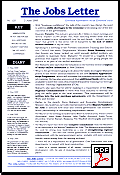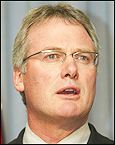
“ We don’t intend this to be a punitive policy. We’re just saying there’s a pretty bright job scene out there...”
— Steve Maharey, Minister of Social Services and Employment
“ There are more important things we need to be looking at before we put huge efforts into chasing perceived malingerers ...”
— Garry Moore, Christchurch Mayor, and chairman of the Mayors Taskforce for Jobs

 LAST Letter
LAST Letter

NEXT Letter 



Download this issue
as a PDF file
Index to Back Issues
Index to Features

—— A draft list of “No-Go” zones compiled by the Sunday Star-Times 11 January 2004
NORTHLAND
Cape Reinga
North Cape
Reef Point
Spirits Bay
COROMANDEL
Kennedys Bay
WAIKATO
Kaiaua
Waikaretu
Port Waikato
Tokoroa
BAY OF PLENTY
Mourea
Horohoro
Gisborne Point
Broadlands
Tikitere
Reporoa
Rerewhakaaitu
Okere
Te Kaha
Kutarere
Opape
Takaputahi
Whitikau
CENTRAL NORTH ISLAND
Ohura
Ongarue
Waimiha
Maitere
Pipiriki
Tatu
Tokirima
TARANAKI
Pungarehu
Aria
Te Wera
Tahora
Kohuratahi
Douglas
Mangamingi
WANGANUI
Mangamahu
Kakatahi
Whanganui River
Jerusalem
Koriniki
Matahiwi
RANGITIKEI
Makohine Valley
Mataroa
Omatane
Poukiorie
Pukeokahu
Putorino
WAIRARAPA
Tinui
Pirinoa
Woodside
Blairlogie
Cape Palliser
Ngawi
Tora
UPPER SOUTH ISLAND
Golden Bay
Murchison
MARLBOROUGH
Ward
Kekerengu
Canvastown
Anakiwa
Clarence
East Bay
French Pass
Kenepuru Sound
Lochmara Bay
Nydia Bay
Queen Charlotte Sound
CANTERBURY
Le Bons Bay
Okains Bay
Little Akaloa
WEST COAST
Ngakawau
Millerton
Denniston
Market Cross
Barrytown
Blackball
Jacksons Bay
Haast
Whataroa
Harihari
Pukekura
Ross
Jacksons
Aickens
Otira
Ahaura
Ngahere
Bell Hill
Rotomanu
Totara Flat
SOUTHLAND
Tuatapere
Ohai
Nightcaps
Blackmount
Colac Bay
Orepuki
 LAST Diary
LAST Diary

NEXT Diary 
|
 |
MAYORS RESPOND TO "NO-GO" ZONES
The most controversial part of last August's "Jobs Jolt" plan has hit troubled waters as Mayors debate the implications of having parts of their districts declared "no-go" zones by the Department of Work and Income.
Under the plan, the Department will draw up a list of "low employment opportunity localities" to which beneficiaries will not be able to move and still collect the unemployment benefit. Only those with real job prospects or extenuating family circumstances will be exempt from the new measures.
Many Mayors (see Voices) support the new measures, while others are concerned about having their rural areas branded with a "no-go, no-hope" label, at a time when local government agencies — as well as the Ministry of Economic Development — are trying to spark interest in developments in the regions.
The Chairman of the Mayors Taskforce for Jobs and Christchurch Mayor Garry Moore says that he has not yet been given any official details of the "no-go" areas, apart from what has appeared in the media. Moore: " The policy was announced in a way that did not advance the partnership between local government and central government through the Mayors Taskforce. Some elements of the Jobs Jolt package are quite good ... but for it to work, you actually have to have co-operation from the people at the cutting edge of things, which in this case is the Mayors."
 Minister of Social Services and Employment Steve Maharey told the New Zealand Herald that Mayors should understand that the government is not denigrating their regions with the "no go" designations ... but is sending a strong message that people should be working. Maharey: "We don't intend this to be a punitive policy. We're just saying there's a pretty bright job scene out there, but we've got places where employers are literally unable to find labour. " Minister of Social Services and Employment Steve Maharey told the New Zealand Herald that Mayors should understand that the government is not denigrating their regions with the "no go" designations ... but is sending a strong message that people should be working. Maharey: "We don't intend this to be a punitive policy. We're just saying there's a pretty bright job scene out there, but we've got places where employers are literally unable to find labour. "
Maharey says that Mayors were justifiably annoyed by the initial failure to consult them before the Jobs Jolt package was announced. He explains that this had happened because funding for the package was uncertain at the time.
Maharey had told media last month that the list of affected areas had been finalised and he expected to reveal it before the end of the year. But he conceded a couple of weeks ago that the plan had sparked a range of concerns, and Work and Income Regional Commissioners were holding meetings to work through the issues.
There has been some speculation in the media that the initial government plans were to blacklist whole regions such as Northland, East Cape and the South Island's West Coast. This broad-brush approach has apparently been replaced by the naming of specific small towns and districts. Maharey has meanwhile been reported as saying that some areas would probably be taken off this "no-go" list if good cases were made locally.
This speculation has led to a flurry of media interest in the proposals, and the Sunday Star-Times produced a full page summary of the "dead zones" issue with a map of almost a hundred proposed towns and districts ... drawn up after interviewing Mayors around the country, and quoting from "a Social Development Briefing paper to Mayors". (Note: Maharey and the Department of Work and Income have not released their official list of areas most likely to be affected ... this has now been delayed until February.)
Maharey has underlined the intention that no-one will be forced to leave their small hometowns to seek work. The new measures will see beneficiaries having their dole cut if they choose to move to the "no-go" areas. But, despite this reassurance, there are widespread concerns over how far Work and Income case-workers will be allowed to twist rural beneficiaries' arms into moving into cities for work.
Rangitikei Mayor Bob Buchanan, who supports the designation of several of his local small communities as "low job opportunity localities", told the Sunday Star-Times that Work and Income has briefed him on plans allowing only beneficiaries with cars, or family or cultural connections, to remain on the dole. Buchanan: " If they've got no reason to stay — cultural or family reasons — they'll say, `Look mate, we can find you a job in Palmerston North. Move there or we'll cut your benefit'."
The newspaper contrasts this with a statement from "a Social Development Ministry briefing paper to Mayors", in which it quotes: "The low job opportunities localities initiative is not designed to . . . require clients who currently live in low job opportunities localities to relocate to areas with better employment prospects. These clients will, however, be expected to continue to meet their work test obligations."
Employers and Manufacturers Association chief executive Alasdair Thompson says that Mayors objecting to "no-go" zones are doing their country a disservice. He says that employers are "desperate" to hire skilled and unskilled workers in many parts of New Zealand, and the scheme should be implemented without delay.
Thompson: "It's a well-established fact that unemployment is highest in areas that combine a good climate, proximity to the coast and low levels of economic development. Unsurprisingly, many people on the dole, especially younger single people, migrate to such areas to live a simple life surfing at the country's expense."
 Green Party welfare spokeswoman Sue Bradford says the "no-go" plan is "social engineering at its worst". Bradford: "It basically tells people where they can and can't live. Instead of developing strong local communities and economies, this government appears committed to depopulating those areas the Ministry of Social Development deems unfit to survive..." Green Party welfare spokeswoman Sue Bradford says the "no-go" plan is "social engineering at its worst". Bradford: "It basically tells people where they can and can't live. Instead of developing strong local communities and economies, this government appears committed to depopulating those areas the Ministry of Social Development deems unfit to survive..."
Bradford is concerned that some parts of New Zealand are going to be written off as economically hopeless, " ... just like the Bantustans in apartheid-era South Africa". She observes that the policy seems to be contradict Jim Anderton's efforts to develop regional communities.
Bradford argues that the focus should be on job creation, and not economic segregation: "One reason some beneficiaries live in rural and provincial areas, where there are fewer jobs, is that it is a lot cheaper to raise a family well in such districts than in big cities like Auckland and Wellington. Unemployed people in big cities are often attracted to rural areas because they can survive better with whanau support, and in areas where rents are cheaper and the land and sea can be a source of food..."
National welfare spokesperson Katherine Rich says the delay in implementing the "no-go" zones was caused by the government's failure to consult. Rich: " Mr Maharey should have been consulting the communities his ideas would have hit hardest. It's not surprising they are now angry... The so-called Jobs Jolt package was only unveiled in August, but the wheels have already fallen off. After four long years in Government, there was almost nothing new in the scheme as it was. Now predictably, we learn Steve Maharey doesn't have regional support... "
ACT welfare spokesperson Muriel Newman accuses the government of unsettling communities throughout the country with its secrecy over the "no-go" zones. Newman: " These delays not only fuel speculation, but they are also highlighting the poor management practice which is now dogging this scheme. Labour announced the Jobs Jolt package in August. Five months is long enough to determine which areas will be classified as "no-go" zones. The Minister should come clean and make his announcement now, rather than keeping communities on tenderhooks..."
NZ First social services spokesman Bill Gudgeon says that the "no-go" zones will consign tens of thousands of New Zealanders in the regions to second class citizenship. Gudgeon: "Maharey's much vaunted Job Jolt scheme is doomed. The Minister needs to come out of his ivory tower and recognise that he is dealing with people who have untapped potential and need opportunities not coercion.
" The infrastructural pressures on cities like Auckland have been caused by Labour's misguided policies and shifting the unemployed to specific economic zones is likely to be just as harmful. The certain result is that there will be greater social dislocation and increasing dependency on the state. The creation of real employment opportunities, a programme of incentives for innovative and exporting businesses, and the provision of appropriate skills for our work force are much more likely to deal with the unacceptably high incidence of unemployment... "
United Future spokesman Bernie Ogilvy asks is it any wonder that we now find the government labelling rural parts of New Zealand as "no-go" areas? Ogilvy: " That's what happens when you put a country's direction on auto-pilot, and that is what successive governments have done to rural and provincial New Zealand. It has been death by a thousand cuts — post offices, banks, all the basic services, and the schools being closed, and now the employment "dead zones". There is no Grand Plan about this. What dogs this country is a total lack of forward planning of any depth ..."
Sources _ New Zealand Herald 5 January 2004 "Dole no go areas delayed" by Ruth Berry; New Zealand Herald 6 January 2004 "Employers want quick action on Jobs Jolt scheme" by NZPA; Sunday Star-Times 11 January 2004 "Revealed: Our dead zone towns" by Jonathon Milne and Mathew Lowe; Sunday Star-Times 11 January 2004 "Alive and Well in the dead zones" full page feature by Jonathon Milne; The Dominion Post 12 January 2004 "Mayors back jobless no-go zones" by Bess Manson and Haydon Dewes; The Press 12 January 2004 "No-go zone list outrages rural folk" by Anna Claridge; Press Release ACT Party Dr Muriel Newman 11 January 2004 "Maharey Says `No-Go' To The Real Answers"; Press Release NZ First Party Bill Gudgeon 5 January 2004 "Social Services Minister Delays Daft Draft"; Press Release Green Party Sue Bradford 5 January 2004 "`No-go zones' are economic segregation"; Press Release National Party Katherine Rich 5 January 2004 "Another wheel falls off Labour's welfare agenda"; Press Release United Future 11 January 2004 Bernie Ogilvie "Ogilvie" We're killing rural NZ"

|

|
“ I think the “no-go” zones will be something of a distraction. There are more important things we need to be looking at — like the rising numbers of sickness beneficiaries — before we put huge efforts into chasing perceived malingerers. I would rather we put positive energy into creating new opportunities for employment so that the other malingering options are not even considered by people.”
— Christchurch Mayor, and chairman of the Mayors Taskforce for Jobs, Garry Moore
|
|

|
“ The policy appears punitive and based on stereotypes of the unemployed. Is there any hard data that beneficiaries moving to jobless areas is actually a problem?”
— Dunedin Mayor, and deputy chairwoman of the Mayors Taskforce for Jobs, Sukhi Turner
|
|

|
“ Further negative images would be created that could easily bring about a downward economic spiral that would impact unfairly on existing residents, including real estate values, economic development, employment opportunities.”
— South Waikato Mayor Gordon Blake
|
|

|
“ I’m not sure about the government’s long-term vision of this country because this scheme might stifle rather than enhance any potential of these places. If people are running and hiding from work, that is not good but I haven’t seen a lot of evidence of that here and we are going through quite an economic boom at the moment. A $7 million conference centre has just been given resource consent at Te Kaha, and there is substantial growth in the region's horticultural industry. There are some very labour-intensive industries developing here and it will also bring a lot of export earnings into the country, so these things warrant a close look before the “no-go” list is released.”
— Opotiki Mayor John Forbes
|
|

|
“ I’m not particularly enamoured with this policy or approach and wonder what impact it is going to have. They are small, remote areas generally with high social deprivation. It’s not going to do anything good for their self-esteem and it won’t be doing great things for the marketing of any particular area. I think the real challenge for us all is getting development in these areas, creating jobs and not barring people going there.”
— Kaipara Mayor Graeme Ramsey
|
|

|
“ It should have been done years ago. If people are unemployed then they have an obligation to be actively finding work. Moving to areas where there is obviously no employment is a no go unless they have transport”
" I’ve seen solo mothers going into an area for cheap rent, and they were inevitably followed by single males, usually undesirables, who spent all their time in the boozers. We’d all like to live in these areas — it’s ideal for lifestyle — but you have to earn a living. No way should unemployed people be going there unless they can fulfil their obligations to the taxpayer.”
— Marlborough Mayor Tom Harrison
|
|

|
“ It’s not so much that we don’t want people coming in there. We do. But if they are looking for employment there’s very little available.”
— Westland Mayor John Drylie
|
|

|
“ The difficulty we have at present is there are job vacancies but we don’t have the skills to fill them. Manukau is working with government agencies to re-skill people so they can find a permanent job close to where they live.”
— Manukau Mayor Sir Barry Curtis
|
|

|
“ We know that we are listed at a fairly high level when we talk about socially deprived areas but we would expect the government to be taking a more positive note. I would hope they send officials into these areas so they can actually acquire some knowledge before making any decisions.”
— Whakatane Mayor Colin Hammond
|
|

|
“ The idea would actually have more merit if it picked up bigger communities like Eketahuna. Masterton Work and Income have had people move to Eketahuna to remove themselves from having to try for jobs.”
— Masterton Mayor Bob Francis
|
|

|
“ People looking for jobs will be encouraged to concentrate on areas, like Wellington, where job opportunities exist. That’s good for the job seeker and good for the city. It will encourage people drawing an unemployment benefit to focus on areas for employment reasons, rather than lifestyle reasons. That’s good for the taxpayer.”
— Wellington Mayor Kerry Prendergast
|
|
|
“ I haven’t had any consultation over this and as ever the first we hear about it is through the media. Kawerau has warded off labels like being a dead economic zone and a low-employment zone in the last 10 years and we will just take things as they come.”
— Kawerau Mayor Malcolm Campbell
|
|

|
“ We’ll be monitoring this as it goes along. In this area everybody knows each other and if there was any great drift into the district of people needing work we would soon know about it.”
— Wairoa Mayor Les Probert
|
|
|
“ My view is that the proposal is clumsy and probably unworkable ... Now recalcitrant beneficiaries can camp out at margins of the district, thumb their noses at authority and collect the benefit till the cows come home.”
— Central Hawkes Bay Mayor Tim Gilbertson
|
|

|
“ They are just small settlements and the only work would be rousing or fencing really. I think it’s probably fairly realistic. We don’t want people turning up to sit on their backsides.”
— Stratford Mayor Brian Jeffares
|
|

|
“ It certainly won’t be the end [of the seven settlements named in the Wanganui area]. It is an initiative that has already worked in other places and I believe it will work well in Wanganui.”
— Wanganui Mayor Chas Poynter
|
|

|
“ I can understand MSD wanting to prevent people moving into areas where there are limited job opportunities or where they can hide. If people really want to work it is possible to find them jobs currently, but there are some folk who don’t want to work and that needs to be taken up with the individuals concerned.”
— Tararua Mayor Maureen Reynolds
|
|

|
“ I don’t see it as a plague on your communities. I see it as a stimulus to get things happening.”
— Tasman Mayor John Hurley
|
|

|
“ The Government is insinuating that people already living there are on the benefit and avoiding work ... It’s as if they are saying there are significant opportunities for people to avoid employment. It’s a slight on those communities. I don’t believe the decision the Government has made achieves anything.”
“ There are many areas on Banks Peninsula where there are not a lot of jobs going and that is because of the nature of the countryside we are living in ... but it is an intriguing piece of analysis to look at an entire province and then draw on three small bays on the Banks Peninsula. I think there are other areas in Canterbury that would have similarly limited opportunities.”
— Banks Peninsula Mayor Bob Parker
|
|

|
“ The Buller district is going ahead, and that’s the best feeling I’ve had for decades. There’s no way I want to see people coming here just to avoid work ... But it’s a disincentive in attracting doctors or district nurses, it’s a disincentive for businesses to start up if they think it’s a dead zone.”
— Buller Mayor Pat O’Dea
|
|
|
“ Clients intending to relocate to the Chatham Islands have an immediate issue of lack of housing.”
— Chatham Islands Mayor Patrick Smith
|
|

|
“ The way the regional inland Otago economy is going at the moment, there’s probably nowhere in Central Otago with ‘limited employment opportunities’. People are driving from Cromwell and Alexandra and Lumsden to Queenstown and Wanaka to work, every pack-house in the district is desperate for fruit packers, the hospitality industries are always looking for people.”
— Central Otago Mayor Malcolm Macpherson
|
|

|
“ Venture Southland has put a lot of effort into attracting skilled workers to Southland, as there are literally hundreds of jobs to be filled. We welcome genuine job seekers to our small communities.”
— Southland Mayor Frana Cardno
|
|
|






 LAST Letter
LAST Letter


 LAST Diary
LAST Diary

 Minister of Social Services and Employment Steve Maharey told the New Zealand Herald that Mayors should understand that the government is not denigrating their regions with the "no go" designations ... but is sending a strong message that people should be working. Maharey: "We don't intend this to be a punitive policy. We're just saying there's a pretty bright job scene out there, but we've got places where employers are literally unable to find labour. "
Minister of Social Services and Employment Steve Maharey told the New Zealand Herald that Mayors should understand that the government is not denigrating their regions with the "no go" designations ... but is sending a strong message that people should be working. Maharey: "We don't intend this to be a punitive policy. We're just saying there's a pretty bright job scene out there, but we've got places where employers are literally unable to find labour. "
 Green Party welfare spokeswoman Sue Bradford says the "no-go" plan is "social engineering at its worst". Bradford: "It basically tells people where they can and can't live. Instead of developing strong local communities and economies, this government appears committed to depopulating those areas the Ministry of Social Development deems unfit to survive..."
Green Party welfare spokeswoman Sue Bradford says the "no-go" plan is "social engineering at its worst". Bradford: "It basically tells people where they can and can't live. Instead of developing strong local communities and economies, this government appears committed to depopulating those areas the Ministry of Social Development deems unfit to survive..."